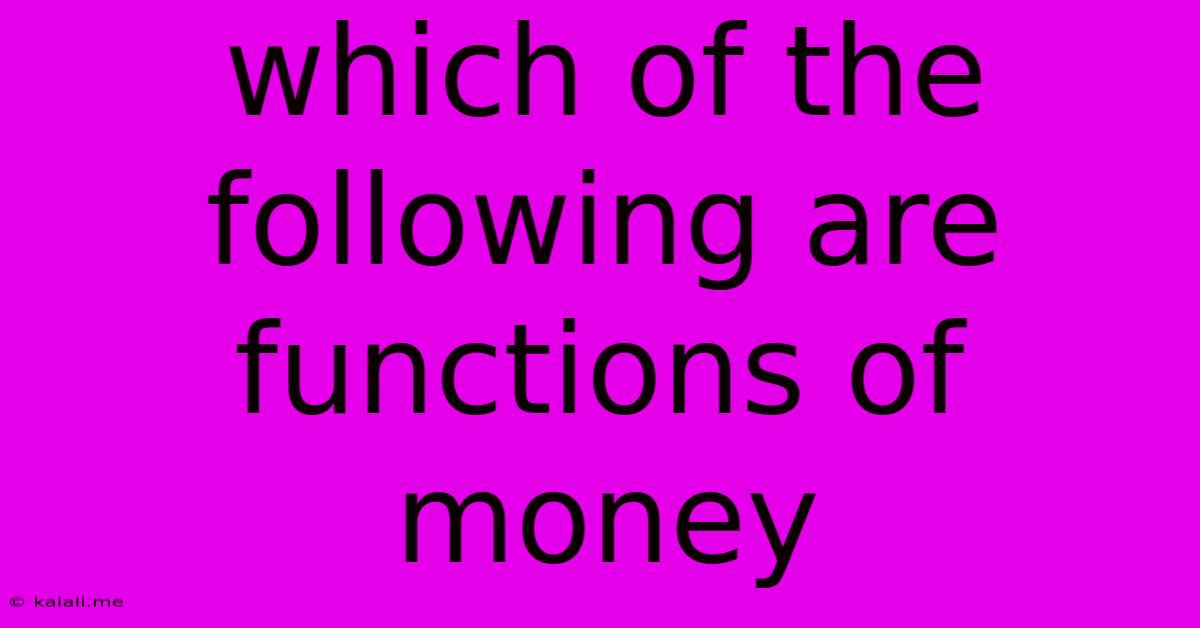Which Of The Following Are Functions Of Money
Kalali
Jun 13, 2025 · 3 min read

Table of Contents
Which of the Following Are Functions of Money? A Deep Dive into Monetary Roles
Money. We use it every day, but how much do we really understand its fundamental functions? This article will explore the core roles money plays in our modern economy, clarifying its multifaceted nature and dispelling any confusion about its purpose. Understanding these functions is crucial for grasping economic principles, personal finance, and the overall health of any economy.
What are the main functions of money? Generally, there are three primary functions, and understanding these is vital for grasping how an economy works. However, some economists argue for a fourth, or even more, functions. Let's dive into the most commonly accepted functions:
1. Medium of Exchange
This is perhaps the most obvious function. Money acts as an intermediary in transactions, eliminating the need for barter. Imagine trying to trade your skills as a web developer for groceries – a cumbersome and inefficient process. Money simplifies this exchange dramatically. Instead of directly swapping goods or services, we use money as a universally accepted medium to facilitate trade. This increases efficiency in markets and allows for specialization of labor. Without a reliable medium of exchange, economic activity would be severely hampered. The ease and speed of transactions are core to a functioning market.
2. Unit of Account
Money provides a standardized unit for measuring the value of goods and services. Without a common unit of account, comparing the worth of different items would be incredibly difficult. Prices act as a common denominator, allowing consumers and businesses to compare alternatives and make informed decisions. This function is essential for economic calculation and planning, from budgeting household expenses to assessing the profitability of large-scale projects. Consider trying to compare the relative value of a car and a house without a common currency – a near-impossible task.
3. Store of Value
Money allows individuals and businesses to store purchasing power over time. While money's value can fluctuate due to inflation or deflation, it provides a relatively stable way to save and defer consumption. This function is crucial for investment, saving for retirement, and building wealth. The ability to save and invest is foundational to long-term economic growth and personal financial stability. Different assets (stocks, bonds, etc.) play varying roles in storing value, but they all ultimately rely on the underlying value of currency.
4. Standard of Deferred Payment (A Fourth Function?)
Some economists consider this a separate function, while others see it as an extension of the store of value function. This refers to money's ability to facilitate transactions that occur over time, such as loans and credit. The ability to borrow and lend money is crucial for economic growth, enabling investments in capital goods and facilitating larger-scale economic activity. Without a reliable standard of deferred payment, long-term economic planning would be severely limited.
In Conclusion:
Understanding the functions of money—medium of exchange, unit of account, store of value, and possibly standard of deferred payment—is fundamental to understanding economics. These functions are interconnected and crucial for a smoothly functioning market and overall economic prosperity. By grasping these roles, you can better understand personal finance, business decisions, and the complex workings of the global economy. Further research into monetary policy and the history of different monetary systems can provide a richer understanding of this essential economic tool.
Latest Posts
Latest Posts
-
What Is The Distance Between Points F And G
Jun 14, 2025
-
The Word Most Opposite In Meaning To Veracity Is
Jun 14, 2025
-
Which Of The Following Is Not A Transition Metal
Jun 14, 2025
-
Which Of The Following Is True About Tsunamis
Jun 14, 2025
-
The Boiling Point Of A Given Liquid Varies
Jun 14, 2025
Related Post
Thank you for visiting our website which covers about Which Of The Following Are Functions Of Money . We hope the information provided has been useful to you. Feel free to contact us if you have any questions or need further assistance. See you next time and don't miss to bookmark.